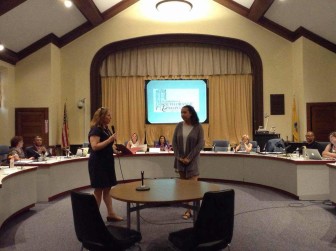At its final meeting of the school year on June 20, the South Orange-Maplewood Board of Education honored this year’s student representative, Nina Kambili.

BOE President Elizabeth Baker presents Nina Kambili with a plaque at the June 20, 2016 Board of Education meeting. (Photo Anna Savittieri.)
Board President Elizabeth Baker called Kambili a “strong advocate for students” and expressed the board’s gratitude telling her, “you are well poised to make an incredible difference in the larger world because you’ve been making an incredible difference in our world.”
Kambili, who as student rep had at times been a staunch critic of the administration, discussed her time in the district as both a student and a witness to the intersection of race and student leadership. Although she felt “extremely lucky” to have been a SOMSD student, she also took the district to task for its sometimes “regressive, accusatory” actions against students of color.
A budding activist from an early age, in fifth grade at Clinton School Kambili wrote down a list of improvements the school could make and submitted them to the principal. Rather than ignoring or disparaging the commentary, the principal invited Kambili into her office to discuss the school’s future, not as student and administrator, but as two concerned community members. The discussion remains as one of her favorite school memories.
However, Kambili said, this support system does not always exist within the district, especially for students of color and even for other student leaders. Unfair treatment can lead students to “check out” or disengage from school at a young age, she said.
Kambili recounted an incident at Columbia High School in which a popular classmate with a top school leadership position was reportedly accused of being under the influence and forced from class for drug and alcohol testing. The tests showed he was sober and a locker raid provided no additional evidence to support the charges, Kambili said.
“Of course,” she added, “he was black.”
If a well-liked, high-performing student could be falsely accused of taking substances at school, what happens to other students, she asked. “How many students were knocked off that path?”
Kambili, who will attend New York University this fall, ended her address to the board by stating that “we cannot have change without giving young people real ownership.”
Here is the full text of Kambili’s statement, which she provided to The Village Green:
As the school year draws to a close I have been reflecting on what it means to be an SOMSD student. In many ways, this district is profoundly modern. Chromebooks and technology are a part of our daily routine. Our new mission statement focuses on empowerment and inspiration in young people. And for all of the discussion around racial issues, even I will concede that we have many people trying very hard to discuss race and eliminate racism in our schools. And in these ways, I am lucky to have been an SOMSD student.
But I also think about the ways that this district is not modern, and maybe even regressive.
I think about a friend and colleague of mine, who is extraordinarily intelligent, outspoken, and who poured a tremendous amount of energy into advocacy and leading a popular club this year. He told me a story about being pulled out of class and accused of being under the influence of drugs. The dean tried to justify his accusation in any way, even opening, sniffing, and dumping out bottles of water and juice which had been sealed. He was sent to the nurse to be tested, but they found nothing. He was sent to get drug tested, and the results confirmed that he was not under the influence of drugs when the dean accused him. He was suspended, but then the charge was removed from his record. Obviously, he is black.
I think of this because my friend is such a prominent student leader. How many other students has this happened to? How many other students in this situation have given up and disengaged, decided that they want nothing to do with a place that would do this to them? How is this regressive, accusatory system making students check out of any feeling of ownership over their community?
And incidents like these add up. Student council members proposing and proposing small changes to improve student life, and being shot down without explanation. Our own student council president, who is supposed to speak at graduation as per tradition and an email sent this June which clearly stated (and I quote): “the student council president will speak at the beginning of the graduation ceremony,” has been “downgraded” to leading the flag salute. Students who put sweat and tears into this community, students who were chosen by their peers to be leaders, are shut down, humiliated, and silenced.
And my question still is: if this happens to student leaders, then what of the rest of the student body? You can trace these issues through the high school, middle schools, even elementary schools. How many children on a path to lead and be involved, were knocked off that path by a dismissiveness and mistrust?
It is the 21st century. We are no longer operating under the model of a teacher in the front of a classroom dictating to silent students and the rod for those who do not comply. This is a place that is supposed to be modern, a place that claims to be heading in a paradigm shifting, “box-breaking” direction. But we can’t have change without giving young people ownership, real ownership. And it should not just be limited to “student leaders.” Every student deserves, and I argue wants a say.
And there are many ways to do this: increased student representation on the board, completely revitalizing the way we run and look at student government, fostering independence, making an understanding of the history and culture of our schools a priority for board members, and so on. But I think that the first change is in attitude. And I really believe that this shift is possible, but only if YOU want it to be. It is certainly harder, but infinitely more rewarding.
I want to close my (very long) comment with one of my favorite memories as an SOMSD student. I was always a bit of a trouble maker, and in fifth grade I wrote Principal O’Neill at Clinton a 5 page letter with several complaints. She followed up almost immediately, scheduled a lunch for us, and we spoke about how to address my concerns. And for those 30 minutes, it was not as principal and 10 year old, but as two people with genuine interest in and love for a place.
We already have the good will and ideas in place. But now we need the courage to trust students, stop beating them down, and allow them to make this place flourish.



